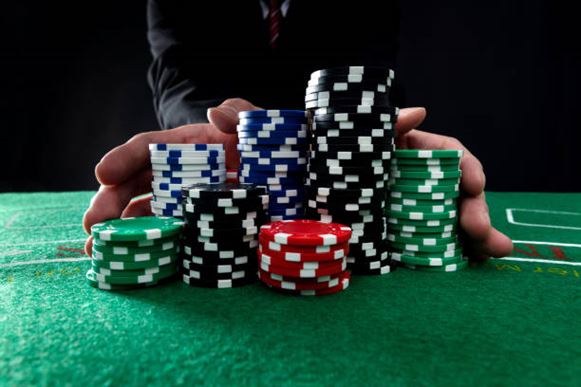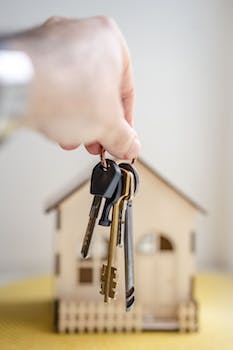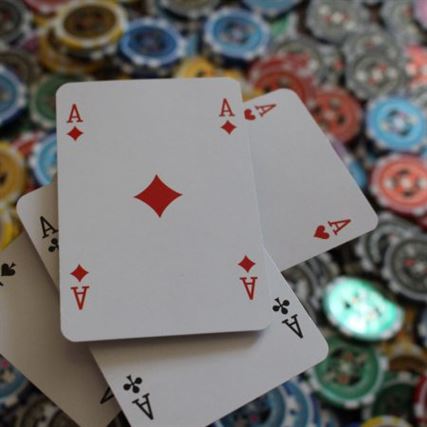Casino Insights: Understanding the House Edge
The world of casinos can be both thrilling and enticing, offering an array of games that promise excitement and potential winnings. However, it is important for players to understand that behind every game lies the concept of the house edge. In this introduction, we will explore the concept of the house edge in casinos and why it is crucial for players to have a clear understanding of it. By grasping this fundamental aspect, individuals can make more informed decisions when gambling, enhancing their overall casino experience.
Understanding the Basics of House Edge in Casino Games
Casino Insights: Understanding the House Edge
When it comes to casino games, players are often fascinated by the glitz and glamour of the environment. The bright lights, the sound of slot machines, and the anticipation of winning big all contribute to the allure of the casino. However, amidst the excitement, there is an important concept that every player should understand – the house edge.
The house edge is a mathematical advantage that the casino holds over the players in any given game. It is a percentage that represents the average amount of each bet that the casino expects to win in the long run. While this may seem like a disadvantage for players, it is actually what allows casinos to stay in business and offer entertainment to millions of people worldwide.
To better understand the house edge, let’s take a closer look at some popular casino games. In roulette, for example, the house edge varies depending on the type of bet. A straight-up bet, where you place your chips on a single number, has a house edge of 2.7% in European roulette and 5.26% in American roulette. On the other hand, betting on red or black gives the house an edge of approximately 1.35% and 2.70%, respectively.
Moving on to blackjack, one of the most popular card games in casinos, the house edge can be minimized through skillful play. The basic strategy, which involves making decisions based on statistical probabilities, can reduce the house edge to as low as 0.5%. However, this requires discipline and knowledge of the game, as well as understanding when to hit, stand, double down, or split your cards.
Slot machines, another staple of casinos, typically have a higher house edge compared to table games. The exact percentage can vary greatly depending on the specific machine and its payout structure. However, it is not uncommon for slot machines to have a house edge ranging from 2% to 15%. This means that for every dollar you bet, the casino expects to keep a certain percentage over time.
Understanding the house edge is crucial for any player looking to make informed decisions and manage their bankroll effectively. It allows players to evaluate the odds and determine which games offer the best chances of winning. By choosing games with lower house edges, such as blackjack or certain bets in roulette, players can increase their chances of walking away from the casino with some winnings.
It’s important to note that the house edge is a long-term average and does not guarantee individual results. In the short term, anything can happen, and luck can play a significant role. However, over an extended period of time, the mathematical advantage of the house will prevail. This is why casinos are able to offer luxurious resorts, extravagant shows, and top-notch service – they have carefully calculated the odds to ensure their profitability.
In conclusion, the house edge is an essential concept for any casino enthusiast to grasp. It represents the advantage that the casino holds over players in various games, ranging from roulette to blackjack to slot machines. Understanding the house edge allows players to make informed decisions and choose games that offer better chances of winning. While luck may play a role in the short term, the long-term math always favors the house. So, next time you step into a casino, remember to keep the house edge in mind as you enjoy the excitement and entertainment it offers.
The Role of House Edge in Casino Profits and Payouts
Casinos have long been a popular destination for those seeking excitement and the chance to win big. However, behind the glitz and glamour lies a carefully calculated system that ensures the house always comes out on top. This system is known as the house edge.
The house edge is the mathematical advantage that a casino has over its players in any given game. It is expressed as a percentage and represents the average amount of each bet that the casino can expect to keep over the long run. For example, if a game has a house edge of 5%, it means that for every $100 wagered, the casino will, on average, keep $5.
Understanding the role of the house edge is crucial for both casino operators and players alike. For operators, it determines their overall profitability and helps them set the odds and payouts for each game. The higher the house edge, the more money the casino stands to make. On the other hand, players need to be aware of the house edge so they can make informed decisions about which games to play.
One might wonder how casinos are able to maintain such an advantage over their patrons. Well, it all comes down to probability and statistics. Casino games are designed with built-in rules and odds that favor the house. Even seemingly fair games like blackjack or roulette have subtle mechanisms that tip the scales in the casino’s favor.
In blackjack, for instance, players must act before the dealer, giving them the opportunity to bust (exceed 21) and lose their bets even if the dealer later busts as well. In roulette, the presence of zero and double zero pockets on the wheel gives the house an edge by reducing the chances of winning on certain bets. These small advantages may seem insignificant, but they add up over time and contribute to the casino’s overall profits.
While some players may get lucky and walk away with a substantial jackpot, the vast majority will eventually succumb to the house edge. This is why casinos can afford to offer lavish amenities, such as free drinks and entertainment, to keep players engaged and coming back for more. They know that in the long run, the odds are stacked in their favor.
However, it’s important to note that the house edge does not guarantee that every player will lose money. In fact, many individuals have had successful gambling experiences and managed to beat the odds. But these instances are outliers and should not be relied upon as a sustainable source of income.
To make the most of their casino experience, players can employ strategies and techniques to minimize the impact of the house edge. For example, some gamblers use card counting in blackjack to gain an advantage over the casino. Others may stick to games with lower house edges, like baccarat or craps, where the odds are slightly more favorable.
In conclusion, the house edge plays a pivotal role in determining the profitability of casinos and shaping the outcomes of individual games. It represents the advantage that the casino has over its players and ensures that, over time, the house always comes out ahead. Understanding the house edge is crucial for both operators and players, as it influences decisions about game design, odds, and payouts. While beating the house edge is difficult, it is not impossible, and players can increase their chances of success by employing strategic approaches. Ultimately, however, it is important to remember that casinos are businesses designed to turn a profit, and the house edge is an integral part of their formula for success.
How House Edge Affects Your Chances of Winning in Casinos
Casino Insights: Understanding the House Edge
When you walk into a casino, the glitz and glamour can be overwhelming. The bright lights, the sounds of slot machines, and the anticipation of winning big can make it easy to forget that behind all the excitement lies a mathematical concept known as the house edge. Understanding how the house edge affects your chances of winning in casinos is crucial if you want to make informed decisions and maximize your gambling experience.
The house edge is a statistical advantage that the casino has over players. It is built into every game and ensures that, in the long run, the casino always comes out on top. This means that no matter how skilled or lucky you are, the odds are stacked against you. But fear not; understanding the house edge doesn’t mean you’re doomed to lose—it simply allows you to make more strategic choices.
Let’s take a closer look at how the house edge works. Imagine you’re playing a classic game like roulette. On the surface, it may seem like a 50/50 chance of winning since there are two possible outcomes: red or black. However, the presence of the green zero pocket tilts the odds slightly in favor of the casino. In European roulette, where there is only one green zero, the house edge is around 2.7%. American roulette, with its additional double-zero pocket, increases the house edge to approximately 5.26%.
Now, let’s explore another popular game: blackjack. Many people believe that blackjack offers better odds than other casino games because it involves both skill and luck. While this is true to some extent, the house still maintains an edge. The house edge in blackjack varies depending on factors such as the number of decks used and the specific rules set by the casino. On average, however, the house edge ranges from 0.5% to 1%, making blackjack one of the most favorable games for players.
It’s important to note that the house edge is a long-term average. In the short term, anything can happen. You may hit a lucky streak and walk away with a substantial win, or you could experience a series of losses. This is known as variance, and it’s what makes gambling exciting and unpredictable. However, over time, the house edge will always catch up, ensuring that the casino remains profitable.
So, how can you use this knowledge to your advantage? Firstly, understanding the house edge allows you to make informed decisions about which games to play. If you’re looking for the best odds, blackjack and certain variations of video poker are your best bet. On the other hand, if you’re seeking high-risk, high-reward thrills, slot machines and some table games like craps might be more appealing.
Secondly, managing your bankroll becomes crucial when you understand the house edge. Set a budget for each gambling session and stick to it. Avoid chasing losses or increasing your bets in an attempt to beat the house. Instead, focus on enjoying the entertainment value of the games while keeping your expectations realistic.
In conclusion, the house edge is a fundamental concept that every casino-goer should grasp. While it ensures that the casino always has an advantage, understanding the house edge empowers you to make smarter choices and approach gambling with a strategic mindset. Remember, luck may come and go, but knowledge is always in your favor.
Exploring Different Casino Games: House Edge Comparison
Casino Insights: Understanding the House Edge
When it comes to casino games, understanding the concept of the house edge is essential. The house edge refers to the mathematical advantage that the casino has over players in a particular game. It is how casinos make money and stay in business. In this article, we will explore different casino games and compare their house edges.
Let’s start with one of the most popular casino games: blackjack. Blackjack is a card game where players try to get a hand value as close to 21 as possible without going over. The house edge in blackjack can vary depending on the specific rules of the game and the skill level of the player. On average, however, the house edge in blackjack is around 0.5%. This means that for every $100 wagered, the casino expects to make $0.50 in profit.
Moving on to another classic casino game: roulette. Roulette is a game of chance where players bet on which number or group of numbers a ball will land on a spinning wheel. The house edge in roulette depends on whether you are playing American roulette or European roulette. In American roulette, which has an extra double zero pocket, the house edge is around 5.26%. In European roulette, which only has a single zero pocket, the house edge drops to 2.70%.
Next up is craps, a dice game that is often seen as one of the more intimidating casino games for beginners. Craps offers various types of bets, each with its own house edge. The simplest bet in craps is the “pass line” bet, which has a house edge of around 1.41%. More complex bets like “hardways” or “any seven” have higher house edges, ranging from 9% to 16.67%. It is important to note that the complexity of craps bets does not necessarily correlate with better odds for the player.
Moving away from table games, let’s take a look at slot machines. Slot machines are the most popular casino game and come in many different themes and variations. The house edge in slot machines can vary greatly depending on the specific machine and its payout percentage. On average, however, the house edge in slot machines ranges from 2% to 15%. This means that for every dollar wagered, the casino can expect to keep between 2 cents and 15 cents as profit.
Lastly, we have video poker, which combines elements of both slots and traditional poker. Video poker is played on a computerized console and offers players the opportunity to make strategic decisions that can affect the outcome of the game. The house edge in video poker can be as low as 0.5% or less if the player uses optimal strategy. However, without proper strategy, the house edge can increase significantly.
In conclusion, understanding the house edge is crucial when playing casino games. It allows players to make informed decisions about which games to play and how to maximize their chances of winning. Whether you prefer blackjack, roulette, craps, slot machines, or video poker, knowing the house edge will give you valuable insights into your odds of success. So next time you step into a casino, remember to keep the house edge in mind and gamble responsibly.
Strategies to Minimize the Impact of House Edge on Your Casino Gameplay
Casino Insights: Understanding the House Edge
Strategies to Minimize the Impact of House Edge on Your Casino Gameplay
When it comes to playing at a casino, understanding the concept of the house edge is crucial. The house edge refers to the mathematical advantage that the casino has over the player in any given game. It is essentially how casinos make their money and stay in business. However, there are strategies that players can employ to minimize the impact of the house edge on their gameplay.
One strategy is to choose games with a lower house edge. Not all casino games are created equal in terms of their odds. Some games have a higher house edge than others, meaning that the casino has a greater advantage over the player. For example, slot machines generally have a higher house edge compared to table games like blackjack or poker. By opting for games with a lower house edge, players can increase their chances of winning and decrease the impact of the house edge on their bankroll.
Another strategy is to learn and implement optimal playing strategies for specific games. Many casino games have optimal strategies that, when followed correctly, can reduce the house edge significantly. Take blackjack, for instance. By using basic strategy charts, players can make mathematically sound decisions based on their hand and the dealer’s upcard. This strategy minimizes the house edge and gives players a better chance of winning in the long run. Similarly, video poker has specific strategies that can be learned to maximize one’s chances of winning.
In addition to choosing games with a lower house edge and employing optimal strategies, managing your bankroll effectively is key. Setting limits on how much you are willing to spend and sticking to them can help mitigate the impact of the house edge. It is important to approach gambling as entertainment rather than a guaranteed way to make money. By setting a budget and only wagering what you can afford to lose, you can enjoy the thrill of casino gameplay without putting yourself at financial risk.
Furthermore, taking advantage of casino promotions and bonuses can also help minimize the impact of the house edge. Many casinos offer incentives to attract new players or reward loyal customers. These promotions often come in the form of free spins, bonus cash, or other perks that can extend your gameplay and give you more opportunities to win. By utilizing these offers wisely, you can increase your chances of coming out ahead even when facing a higher house edge.
Lastly, it is important to remember that luck plays a significant role in casino games. While strategies and tactics can improve your odds, there is always an element of chance involved. It is crucial to approach gambling with a realistic mindset and not rely solely on strategies to overcome the house edge. Enjoying the experience and having fun should be the primary goal, rather than solely focusing on winning.
In conclusion, understanding the concept of the house edge is vital for any casino player. By choosing games with a lower house edge, employing optimal strategies, managing your bankroll effectively, taking advantage of promotions, and maintaining a realistic mindset, you can minimize the impact of the house edge on your gameplay. Remember, while strategies can enhance your chances of winning, luck will always play a role in determining the outcome of casino games. So, embrace the thrill of the game and gamble responsibly.
Unveiling the Mathematics behind House Edge in Casinos
Casino Insights: Understanding the House Edge
In the world of gambling, there is a concept that holds great importance for both players and casino operators alike – the house edge. It is a mathematical principle that determines the long-term profitability of casinos and the odds stacked against players. To truly understand the dynamics at play, it is crucial to delve into the mathematics behind the house edge.
At its core, the house edge represents the statistical advantage that the casino has over the players in any given game. It is often expressed as a percentage, indicating the average amount of each bet that the casino expects to win over time. This percentage varies from game to game, but it is always present, ensuring that casinos maintain their profitability.
To comprehend how the house edge is calculated, let’s consider an example using one of the most popular casino games – roulette. In this game, there are 36 numbers on a wheel, plus a single zero or double zero, depending on the variation being played. The presence of these extra slots gives the casino an advantage, increasing the probability of winning for them.
When calculating the house edge in roulette, we look at the number of possible outcomes and compare it to the payout for a winning bet. In European roulette, where there is only a single zero, there are 37 possible outcomes. However, if you were to bet on a specific number and win, the payout would only be 35 to 1. This discrepancy creates a house edge of approximately 2.7%.
The same principles apply to other popular casino games such as blackjack and slot machines. In blackjack, the house edge is influenced by factors like the number of decks used and the rules regarding doubling down and splitting. Slot machines, on the other hand, have their house edge determined by the design of the reels and the symbols displayed on them.
Understanding the house edge is crucial for players because it allows them to make informed decisions about which games to play. By knowing the odds stacked against them, players can choose games that offer a lower house edge, increasing their chances of winning in the long run. However, it is important to note that even with a low house edge, luck still plays a significant role in determining individual outcomes.
For casino operators, the house edge serves as the foundation for their profitability. It ensures that over time, they will always make a profit, even if individual players win big on certain occasions. This mathematical advantage allows casinos to stay in business and continue offering exciting gambling experiences to their patrons.
In conclusion, the house edge is a fundamental concept in the world of gambling. It represents the statistical advantage that casinos have over players and determines the long-term profitability of these establishments. By understanding the mathematics behind the house edge, both players and casino operators can navigate the complex world of gambling with greater knowledge and insight.




